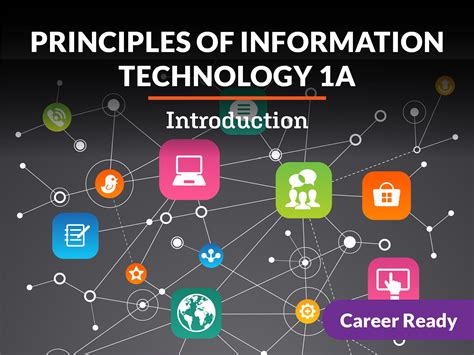The increasing reliance on technology has transformed the way we live, work, and interact with one another. At the heart of this technological revolution is information technology (IT), which has revolutionized the way we access, process, and communicate information. To fully harness the potential of IT, it is essential to understand the fundamental principles that underpin this field. In this article, we will explore the 7 key principles of information technology, providing insights into the core concepts that drive this rapidly evolving field.

Principle 1: Data is the Lifeblood of IT
Data is the foundation of information technology. It is the raw material that is collected, processed, and transformed into meaningful information. Understanding the characteristics, types, and structures of data is essential for effective IT management. This includes recognizing the differences between qualitative and quantitative data, as well as understanding the importance of data accuracy, integrity, and security.
Principle 2: Information Systems are the Backbone of IT
Information systems are the hardware, software, and human elements that work together to collect, process, and disseminate information. These systems can be categorized into different types, including transactional, analytical, and collaborative systems. Understanding the components, functions, and relationships between these systems is crucial for designing and implementing effective IT solutions.

Principle 3: Networks are the Infrastructure of IT
Networks are the communication pathways that enable data exchange between devices, systems, and applications. Understanding network fundamentals, including topology, protocols, and architecture, is essential for designing and implementing efficient and secure network infrastructure.
Principle 4: Cybersecurity is a Critical Component of IT
Cybersecurity is the practice of protecting IT systems, networks, and data from unauthorized access, use, disclosure, disruption, modification, or destruction. This principle emphasizes the importance of implementing robust security measures, including encryption, firewalls, and access controls, to safeguard sensitive information and prevent cyber threats.

Principle 5: Software Development is a Key Enabler of IT
Software development is the process of designing, creating, testing, and maintaining software applications. This principle highlights the importance of software development methodologies, including agile, waterfall, and hybrid approaches, in delivering high-quality software solutions that meet business needs.
Principle 6: Data Analytics is a Powerful Tool for IT
Data analytics is the process of examining data sets to draw conclusions and make informed decisions. This principle emphasizes the importance of data analytics techniques, including statistical analysis, data mining, and data visualization, in extracting insights and value from data.

Principle 7: Emerging Technologies are Transforming IT
Emerging technologies, including artificial intelligence, blockchain, and the Internet of Things (IoT), are transforming the IT landscape. This principle highlights the importance of understanding the potential applications, benefits, and challenges of these technologies in driving business innovation and growth.

In conclusion, the 7 key principles of information technology provide a foundation for understanding the complex and rapidly evolving field of IT. By grasping these principles, individuals and organizations can harness the power of IT to drive business success, improve decision-making, and enhance overall efficiency.
Call to Action:
We invite you to share your thoughts on the 7 key principles of information technology. How do you think these principles will shape the future of IT? What emerging technologies do you believe will have the greatest impact on the industry? Share your comments and let's continue the conversation!
Gallery of Info Tech Principles:






FAQ Section:
What is the importance of data in IT?
+Data is the lifeblood of IT, providing the raw material for decision-making, business intelligence, and innovation.
What are the key components of information systems?
+Information systems consist of hardware, software, and human elements that work together to collect, process, and disseminate information.
Why is cybersecurity essential in IT?
+Cybersecurity is critical in IT to protect sensitive information and prevent cyber threats, ensuring the confidentiality, integrity, and availability of data.
